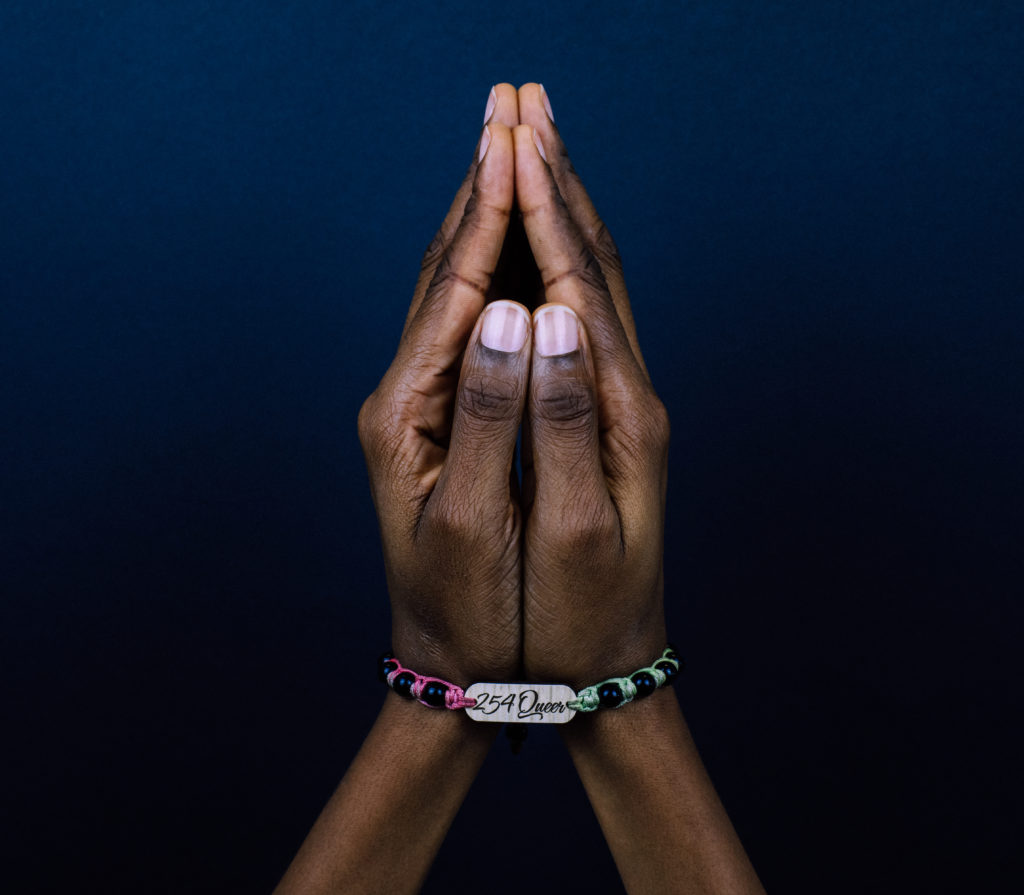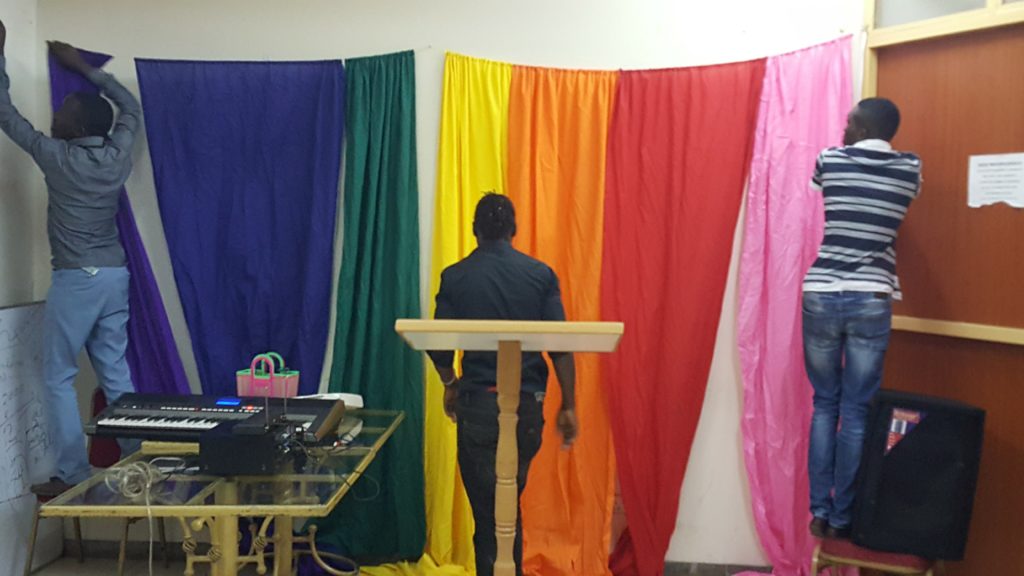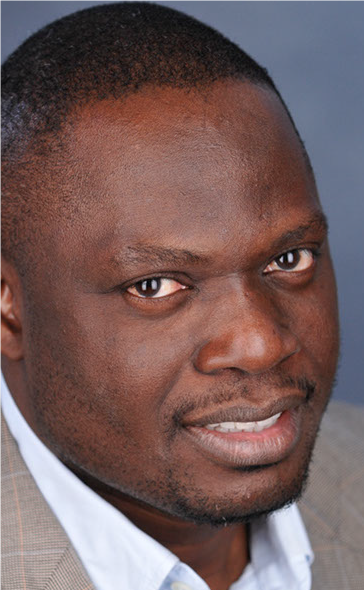
For a culture supposedly unforthcoming in matters of sex, Africans have been doing a lot of talking about sex lately. In hindsight, the dam of this discursive freedom was burst open by the HIV/AIDS pandemic as, beginning in the late 1980s, public health concern over the spread of the HIV virus quickly instigated broader moral and political questioning around intimacy, privacy, sexuality, affect, gender relations, and identity. The ascendant techno-media effectively dashed any lingering hopes of a return to the presumed reticence of old. If anything, the new media dispensation, the sensations always overlaid with the dangers, has enabled vigorous debates and risqué explorations. The old apprehension may have been about getting the genie back in the bottle. The fear nowadays is that the bottle itself may have been smashed beyond recognition.
Unease over homosexuality is one aspect of this general sexual effervescence. The prickliness that has been its central feature is linked to larger disputations and struggles over meaning, personhood, love, and, last but not least, family. The saying “Everything in life is about sex, with the exception of sex, which is about politics” is widely attributed to Oscar Wilde. Whether or not we agree that everything in life is, at bottom, about sex, the conclusion that sex is about politics seems safe enough, though how we understand politics here is key. When Africans contend over “good” (not to be mistaken for exhilarating) and “bad” (not to be mistaken for depressing) sex, they are, we might reasonably infer, sparring over moral questions with direct implications for community, the supposed health and preservation of the latter being the ultimate purpose of politics. With that in mind, we should not be surprised at the passion that questions around homosexuality elicit. Nor, given the historical centrality of religion to social life across the continent, should we be puzzled that homosexuality—as a matter of fact, sex, period—is constantly shadowed by references to sin, evil damnation, and salvation.
Kenyan, Christian, Queer is not the first book to plunge into this vortex. The study of sex, identity, and spirituality has expanded radically in recent years. Nevertheless, as a queer European scholar who is a Christian to boot, Professor Adriaan van Klinken seems uniquely poised to delve into this area of study. He has written in the past with sensitivity, sympathy, generosity, and amazing frankness about the travails of masculinity, the politics and aesthetics of sexual citizenship, and the emerging field of queer theology in Africa. The same admirable traits and tendencies are on display throughout this book. Never less than sensitive to the advantages and privileges that may redound to him on account of his pigmentation and citizenship, he acts and writes in the hope that they may be discounted by his sexual and religious identity, if not by his fervent affection for the African continent.
Van Klinken’s overriding project is to articulate “a counternarrative to the well-known narrative of ‘African homophobia,’” the need for such a project being necessitated by the perception that, contra the evident advance in other parts of the world—especially in the western democracies where the success of LGBT claims for equal humanity is such that any apparent dissent is likely to be met with instant sanction—Africa stubbornly clings to heterosexuality as the sexual ideal. The reality, suffice to say, is more complicated. In the first place, the picture of an African continent totally out of sync with the rest of the world is less than accurate, especially when you consider that the struggle for acceptance is far from complete even in those countries where one can point to considerable gains. In the United States, particularly among religious conservatives, there is lingering disquiet, if not about homosexuality per se, about how far (too far is the fear) the push for the recognition of rights of minoritized groups might be go in reframing American ethos and culture. Accordingly, American evangelical outreach against homosexuality in Africa, which has exploited a cultural concern with the family, is partly born out of frustration with grounds ceded to the onslaught of secular forces back home.
On that basis, some have deduced that the conservative wing of American Christianity is the engine of African homophobia. This is only partly true. Homophobia in Africa is, as is to be expected, propelled by a wide range of local and external cultural, social, and political forces. As a matter of fact, it is precisely this interplay of internal and external impulses that places African homophobia within the stream of human experience. Nor is the complementary claim, now surprisingly popular in some quarters, that Africa was an Eden of sexual tolerance before contact with European colonizers, backed up by anything more than wishful thinking and Afrocentric fantasy (that, and a sliver of dubious data). For all sorts of reasons, same-sex relationships have been largely frowned upon across human society, and Africa is no exception. Imputing that African disgust at homosexuality is a function of colonial reeducation is nonsense.
Homophobia in Africa is, as is to be expected, propelled by a wide range of local and external cultural, social, and political forces. As a matter of fact, it is precisely this interplay of internal and external impulses that places African homophobia within the stream of human experience.
Van Klinken knows this, and, while not denying the travails of living as a homosexual in Africa, or, more specifically, the role of religion in the generation and sustenance of hostility towards homosexuality, nonetheless prefers to be led by the shafts of light flashing insistently against the gloomy backdrop. He is more interested, he says, “in the other side of this coin: in how lgbt activism in Africa also uses and relies on religious language and symbols” (6; my emphasis.) He does this through a set of Kenyan case studies. These include a close reading of selected literary, film, and social media texts of the late gay activist, Binyavanga Wainaina; an analysis of a music video, “Same Love,” released by the Kenyan hip-hop group Art Attack; an analysis of the sexual, cultural, and religious dimensions of Stories of Our Lives, an anthology compiled by the Kenyan art collective, The Nest; and finally an ethnography of Cosmopolitan Affirming Church, a Nairobi-based LGBT-affirming church community established in 2013. Through these examples, van Klinken hopes to muster enough troops to repel the idea that Africa is uniformly homophobic, and that, contrary to appearances, things are far from static. He writes: “My interest is in the ways in which notions of African culture, identity, and history are invoked, deployed, and negotiated…while acknowledging the complex and multiple ways in which Africa is part of a globalized world—culturally, politically, and religiously. This interest allows me to explore queer African imaginations and their relation to globalized discourses of lgbt activism and queer politics” (17).
Very well, although some might cavil, and not without merit, at the practicality of achieving all this from the standpoint of a single African country, and on the basis of four randomly selected examples. It is one criticism that van Klinken appears to have anticipated, judging by the assiduousness with which he protects his flanks. He makes clear that all he is trying to do is explore how the four cases, though originating in Kenya, help “speak to broader lgbt realities on the African continent and contribute to African queer politics more generally” and “respond to social and political homophobia in different parts of the continent in various ways, presenting a range of lgbt activist strategies and opening up alternative queer imaginations” (17). If only for this, for anyone seeking some emotional uplift about the condition of queer Africa, this is the book to read. It is a brilliant analysis of ordinary and not so ordinary gay people cocking a snook at the Man in his various guises, having fun despite the all too real strictures on gay life, pursuing pleasure, building a community, all the while remaining resolutely Kenyan, Christian, and queer all at once.
Given what I just said, it might seem a strange charge to bring against a book of which one is otherwise enamored, but I happen to find van Klinken’s optimism somewhat jarring. Perhaps this is because, being Nigerian, and being fully aware of the Nigerian situation with respect to homophobia, hope does not come easily to me. Recently, as I have collected data for a planned monograph on sexuality and the struggle for belonging in Nigeria, I have been struck by the sheer number of LGBT Nigerians who have fled the country because of persecution, whether manifested as physical violence by the police, or violent rhetoric by religious leaders and the media. Knowing this dampens my mood, and returns me to the question of how much can be read into the four case studies in question. Is there something to be said about such cases standing out precisely due to their rarity, and is there, hence, a danger of reading too much into what they symbolize? What, really, are the chances of delegitimizing and upstaging Pentecostal demonology around homosexuality, never mind substituting it with an alternative notion of Christian love considering the former’s popularity and the cultural hostility which, all told, endures? Is Kenya more profitably compared with South Africa, where members of the LGBT community can at least take some pride in the continent’s most generous legal protections? To what extent is the Nigerian situation suggestive of important regional variations in patterns of political homophobia, sexual citizenship, and sexual mores?

The reader feels fortunate that, in examining the four case studies, van Klinken unwittingly takes us into the pulsating heart of Kenyan civil society. We are introduced to a wealth of interlocutors inside church communities, inside various civic associations, in night clubs, on screen, and across the pages of diverse literary and artistic texts. However, we are never afforded more than a faint glimpse of the secular principalities, powers, and “the rulers of the darkness of this world” that we know they are at war against (Ephesians 6:12). I am referring to the Kenyan state of course. For a work that, rightly, focuses on the “political significance” of various artistic expressions and arts of resistance, one wishes that the state were more than a spectral presence, although one also recognizes in the oversight traces of a perceptual shift dating back to the inception of scholarly interest in civil society in the late 1980s.
Those quibbles aside, what van Klinken has given us is much more than a book about homosexuality in Africa. It is an astounding ero-ethnography in which the author grapples with the question of the research field as a site of desire and vulnerability. He does this across the four Interludes which punctuate the book, setting up and exfoliating themes of a rather personal nature, and seeing in his own distress a physical metaphor for the bodily vulnerability and contingency that is the basis of human solidarity.
What van Klinken has given us is much more than a book about homosexuality in Africa. It is an astounding ero-ethnography in which the author grapples with the question of the research field as a site of desire and vulnerability.
It is not unlikely that some of the personal disclosures in the book will raise some hackles. No matter. What is important is that we understand, first, van Klinken’s struggles with what he calls “the management of more subtle manifestations of erotic subjectivity and of the fluid boundaries between embodied relationality, friendship, intimacy, and sex” (96); and second, that in electing to disclose his relationships and HIV status—and doing so with the kind of raw poignancy one rarely encounters in scholarly work—van Klinken is acting in loyalty to the very principle we all claim to cherish as scholars: academic honesty and integrity.
It remains to be seen whether future ethnographies will pick up the gauntlet he has so fearlessly and admirably thrown down.

